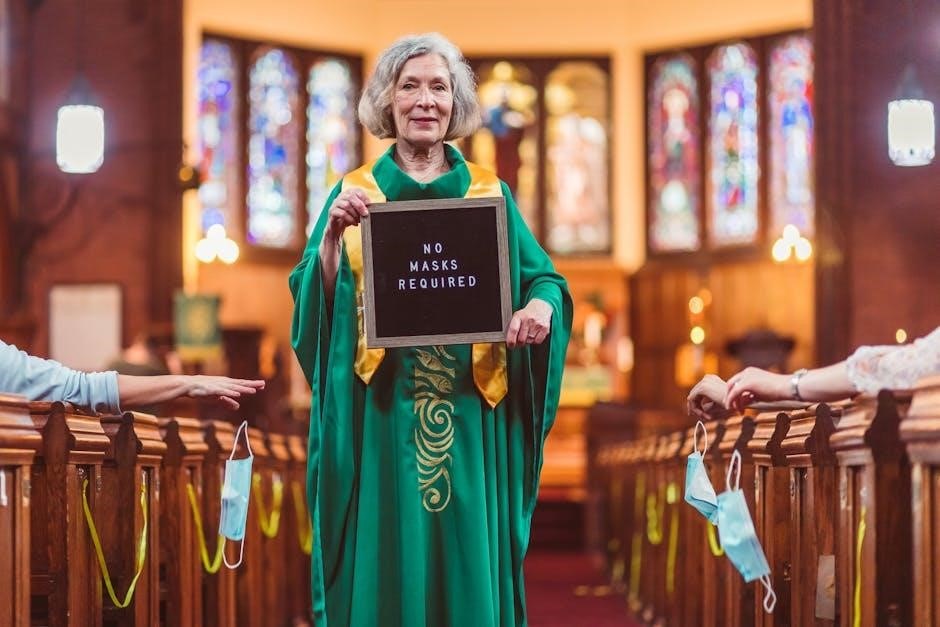
Church elders are spiritual leaders entrusted with shepherding the congregation, ensuring doctrinal purity, and overseeing church operations. Their role is deeply rooted in biblical teachings and examples, providing guidance, prayer, and pastoral care to foster a healthy, God-centered community.
Overview of the Biblical Basis for Church Elders
The role of church elders is established in Scripture, with clear qualifications and responsibilities outlined in Titus 1:5-9 and 1 Timothy 3:1-7. The Bible emphasizes their duty to shepherd God’s flock, maintain doctrinal purity, and provide spiritual oversight. Acts 6:1-6 highlights the appointment of deacons, distinguishing elders’ spiritual leadership from practical service. The New Testament consistently portrays elders as mature, godly leaders entrusted with guiding the church according to God’s Word, ensuring its health and faithfulness.
Historical Development of the Role of Elders in the Church
The role of elders evolved from Jewish synagogue leaders to early church overseers. In Acts 11:30 and 14:23, elders were appointed to guide local churches. By the Reformation, Calvin and others reemphasized biblical eldership, shaping Presbyterian governance. Through centuries, elders’ responsibilities adapted, yet their core duties of spiritual oversight, doctrinal guardianship, and shepherding remained consistent, reflecting their biblical mandate to lead and care for God’s people with integrity and humility.
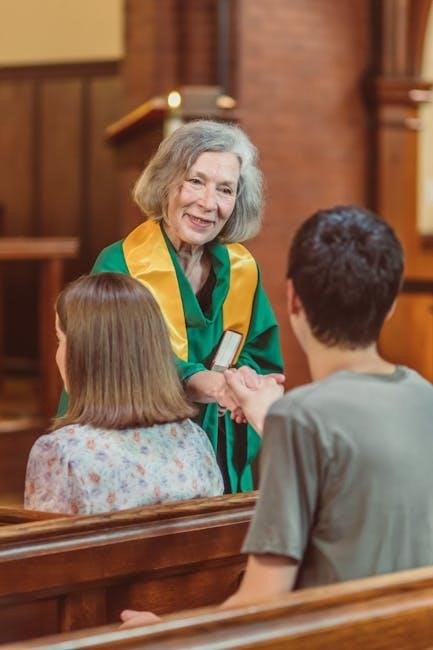
Spiritual Leadership and Oversight
Elders provide spiritual leadership by overseeing the church, shepherding believers, and upholding biblical integrity. They pray for the flock, lead by example, and ensure doctrinal purity.
Leading by Example in Faith and Conduct
Elders must model Christ-like character, demonstrating integrity, humility, and consistency in their faith and daily lives. They are expected to lead by example in prayer, worship, and service, inspiring the congregation to follow their footsteps. Their conduct should reflect biblical values, fostering trust and respect within the church community. By living out their faith authentically, elders provide a moral compass, guiding believers toward spiritual maturity and a deeper relationship with God;
Overseeing Church Operations and Ministries
Elders are responsible for overseeing church operations, ensuring all ministries align with the church’s mission and values. They provide strategic direction, make informed decisions, and ensure resources are used responsibly. Elders collaborate with other leaders to maintain order and promote unity. By overseeing budgets and financial practices, they ensure accountability and proper stewardship of God’s resources, fostering a culture of integrity and efficiency in church management and ministry activities.
Maintaining Doctrinal Integrity and Purity
Elders are tasked with safeguarding the church’s doctrine, ensuring teachings align with Scripture. They refute false doctrines and promote sound biblical truths. By modeling Christlike behavior and actively engaging in teaching, elders uphold the church’s theological foundation. Their role includes correcting errors and fostering unity in belief, ensuring the congregation remains grounded in God’s Word and guided by His principles for a pure and faithful community.
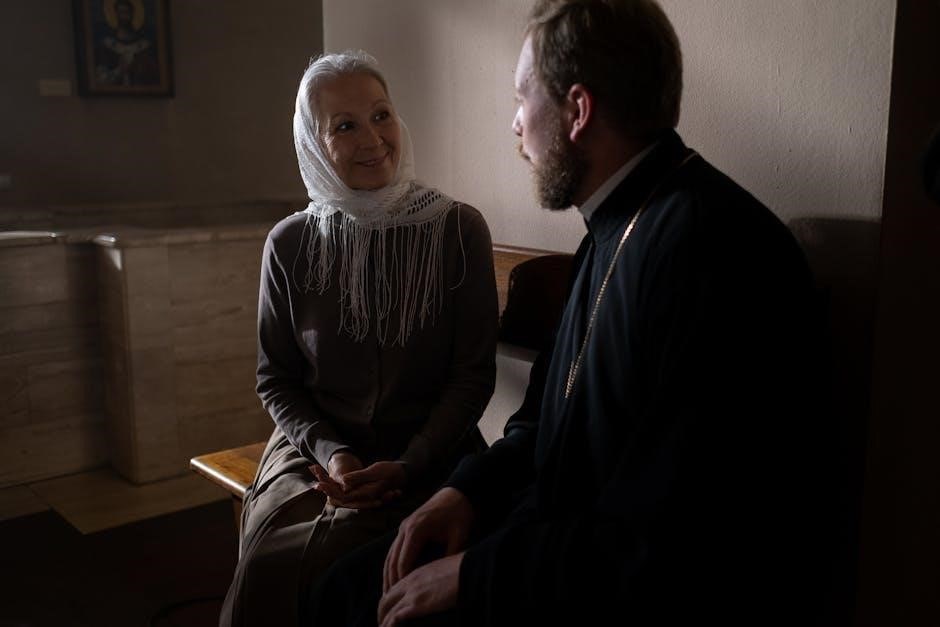
Shepherding the Flock
Elders are called to shepherd God’s people with care, providing spiritual nurture and protection; They guide believers in faith, help resolve conflicts, and ensure members grow in Christ, fostering a loving and united church family.
Feeding the Flock Through Teaching and Preaching
Elders are responsible for feeding the flock through the ministry of the Word and Spirit. They teach sound doctrine, preach the gospel, and provide spiritual nourishment to guide believers in their faith. By proclaiming God’s truth, they help the congregation mature in Christ and discern His will. This duty ensures the flock is well-fed spiritually, equipping them to live godly lives and fulfill their calling in obedience to Scripture.
Protecting the Flock from Spiritual Harm
Elders are tasked with safeguarding the congregation from spiritual harm by identifying and addressing false teachings. They prayerfully watch over the flock, ensuring members remain grounded in sound doctrine. By providing guidance and correction, elders help believers avoid deceitful influences, fostering a spiritually healthy community. This protective role is vital, as elders act as guardians of the church, ensuring its purity and alignment with biblical truth.
Ensuring Doctrinal Purity
Elders are responsible for upholding biblical truth and refuting false teachings, ensuring the church remains doctrinally pure. They teach sound doctrine, guiding the congregation in orthodox belief and practice, and correct deviations from scriptural standards to maintain spiritual integrity.
Teaching Sound Doctrine and Refuting False Teachings
Elders are tasked with teaching sound doctrine and refuting false teachings to maintain doctrinal purity. They instruct the congregation in biblical truths, correct erroneous beliefs, and ensure alignment with scripture. This mandate is rooted in 1 Timothy 4:14 and Acts 6, emphasizing the importance of spiritual oversight. By prayerfully upholding these duties, elders safeguard the church’s integrity and foster a community grounded in God’s Word, ensuring believers grow in faith and understanding.
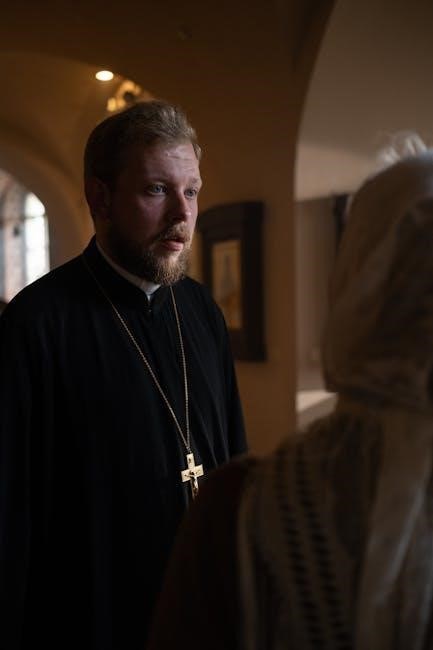
Prayer and Intercession
Elders are called to pray for the flock and the church, upholding a biblical mandate to intercede and seek God’s guidance and grace.
Praying for the Flock and the Church
Elders are mandated to pray for the congregation, seeking God’s guidance, healing, and protection. Their intercession uplifts spiritual needs, unity, and growth, aligning the church with God’s will. Biblically, elders are called to intercede, as seen in 1 Timothy 4:14, emphasizing prayer as a vital duty. Regular, heartfelt prayer fosters a God-centered community and strengthens believers in their faith journey.
Teaching and Preaching the Word
Elders are responsible for teaching and preaching the Word, guiding and nurturing the congregation through scriptural truths and spiritual encouragement.
Ministering the Word of God in All Circumstances
Elders are called to minister the Word of God in every situation, feeding the flock through teaching and preaching. They provide spiritual nourishment and guidance, ensuring the congregation remains grounded in biblical truths. This ministry involves sharing the Word with sensitivity and wisdom, addressing the needs of the people, and encouraging growth in faith. Elders are also tasked with refuting false teachings, keeping the church steadfast in doctrine and practice.
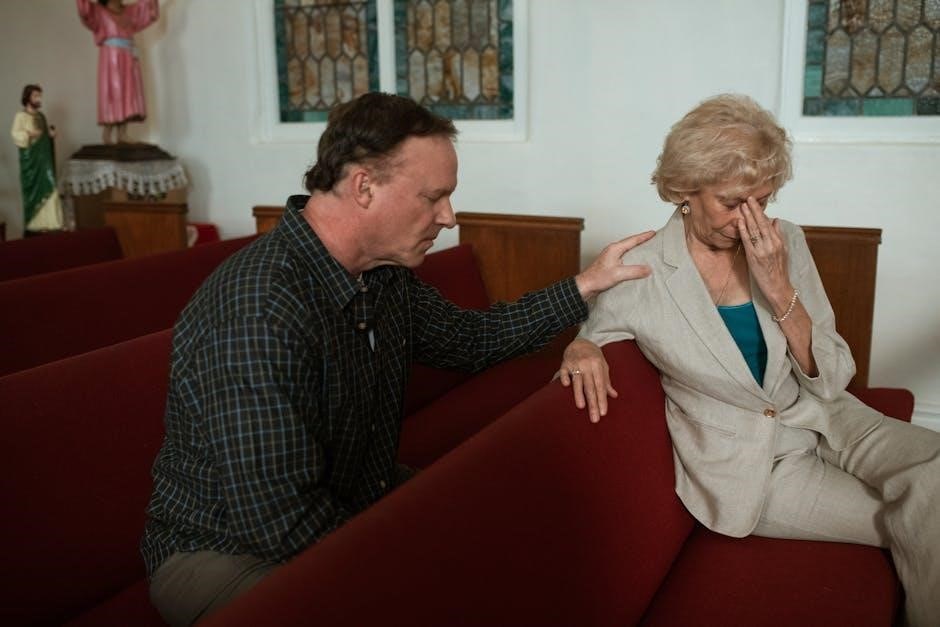
Community and Congregational Oversight
Elders provide guidance and oversight to the church community, ensuring unity and spiritual health. They coordinate ministries, fostering effective outreach and care for all members.
Working Together with Other Church Leaders
Elders collaborate with pastors, deacons, and other leaders to ensure the church’s mission is fulfilled. They work in unity, leveraging their gifts and experiences to lead effectively. Elders and deacons serve distinct roles, with elders focusing on spiritual oversight and deacons on practical service. This teamwork fosters a balanced approach to ministry, ensuring both spiritual and physical needs are met. By working together, they model Christlike servanthood, promoting harmony and effectiveness in church operations.
Pastoral Care and Counseling
Elders provide guidance, emotional support, and prayer to church members, addressing their spiritual and personal needs with compassion and biblical wisdom.
Providing Guidance and Support to Church Members
Elders are called to provide spiritual guidance, emotional support, and prayer for church members, addressing their personal and spiritual needs with compassion. They offer biblical counsel, helping members navigate life’s challenges while fostering a deeper relationship with Christ. Elders are also available to assist in resolving conflicts and promoting unity within the church. Their role includes encouraging believers in their faith journey and equipping them for ministry, ensuring the congregation grows in love, wisdom, and service to others.
Administering Sacraments
Elders are responsible for leading sacramental duties, such as communion and baptisms, ensuring these sacred acts reflect biblical integrity and foster spiritual unity among believers.
Leading in Sacramental Duties and Worship Services
Elders are entrusted with conducting sacred sacraments like communion and baptisms, ensuring these rituals are performed with biblical integrity and reverence. They lead worship services, fostering a spirit of unity and devotion among the congregation. Their role in these duties emphasizes the importance of maintaining the sanctity of these acts, which are central to the church’s spiritual life and the believers’ walk with God.
Church Discipline and Accountability
Elders are responsible for maintaining order and discipline within the church, addressing sin, and guiding the congregation toward repentance and righteousness, ensuring biblical standards are upheld.
Maintaining Order and Discipline Within the Church
Elders are tasked with upholding biblical standards, addressing sin, and promoting holiness among members. They ensure discipline is applied lovingly and justly, guiding the church toward unity and purity. By addressing conflicts and Wayward behavior, elders protect the church’s spiritual integrity, fostering an environment of accountability and restoration. This role is essential for maintaining a healthy, Christ-centered community that reflects God’s will and purposes. Elders must act with wisdom, compassion, and firmness in all disciplinary matters.
Financial Oversight and Management
Elders ensure responsible stewardship of church resources, overseeing financial management to align with God’s will and maintain integrity in all fiscal operations.
Ensuring Responsible Stewardship of Church Resources
Elders are tasked with managing church finances transparently, ensuring resources align with biblical principles. They oversee budgeting, accountability, and ethical use of funds to support ministry goals and maintain trust within the congregation. This role requires wisdom, integrity, and a commitment to honoring God through responsible stewardship, as outlined in Scripture.
Servant Leadership and Humility
Elders are called to model Christlike humility, prioritizing the needs of others and leading with selflessness. Their role reflects Jesus’s example of serving, not seeking power or recognition.
Modeling Christlike Servant Leadership
Elders embody Christlike servant leadership by prioritizing humility, compassion, and selflessness. They serve the church with integrity, fostering unity and spiritual growth. Their actions reflect Jesus’s teachings, emphasizing love, sacrifice, and devotion to others. Elders lead by example, demonstrating a willingness to serve in various capacities, from spiritual guidance to practical needs. This approachability and genuine care inspire the congregation to follow Christ’s example, creating a culture of servant-hearted ministry within the church.
Prayer is vital for sustaining elders, upholding their faith and wisdom. The church should continually intercede for their strength and effectiveness in ministry, ensuring fruitful, God-honoring service.
Praying for Elders and Their Ministries
Prayer is essential for elders, as it strengthens their faith, wisdom, and ability to lead. The church should continually intercede for their spiritual protection, clarity in decision-making, and effectiveness in shepherding. Praying for elders ensures they remain humble, compassionate, and aligned with God’s will. This support enables them to fulfill their duties with integrity and love, fostering a healthy, thriving church. Regular prayer for elders also promotes unity and trust within the congregation, affirming their vital role in God’s mission.




